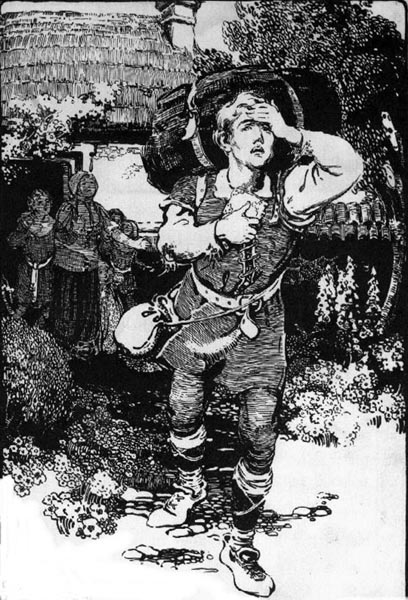 |
| Burdened Christian flees from home (Wikipedia) |
Note: John Bunyan's Pilgrim's Progress was a favorite for many, many years, read alongside the Bible as a means of bringing up proper Christians. It no longer shares widespread popularity.
Get Ready: What do you think of didactic or "preachy" literature in the guise of a novel or other literary form?
The Pilgrim's Progress is a rather heavy-handed allegory of the pleasures and pitfalls of the Christian life.
In fact, our first indication of author John Bunyan's lack of subtlety is that he has named his protagonist "Christian." We follow that hapless "everyman" to his destination, revealed in the book's full title: The Pilgrim's Progress from This World, to That Which Is to Come. That is, he is on his way to Heaven, called here "The Celestial City."
The book is told in the form of a dream sequence. Christian sets out from his hometown, transparently named the "City of Destruction" (which represents this world, as opposed to Heaven) carrying a great burden made up of his sins.
He also carries a Bible with him, and the first important person he meets is named "Evangelist," a word that describes a person who preaches the Christian message. As Christian heads toward the "Wicket Gate" pointed out to him by Evangelist, two more characters, Obstinate and Pliable, try to get him to return. Obstinate gives up, but Pliable goes along with Christian, hoping to share in the reward he is seeking. Soon, however, they fall into the Slough of Despond, a boggy place which brings out one's doubts, fears, and guilty memories, and Pliable abandons Christian.
Christian is saved by Help, and then meets an enemy named Mr. Worldly Wiseman, who tries to convince him that secular ethics are all he needs. He directs Christian to characters like Mr. Legality and his son Civility, who live in a village named Morality. In Bunyan's philosophy, doing good deeds--"morality"--is not enough. Only God can save. Evangelist arrives and exposes these secular thinkers as frauds and directs Christian to return to the proper way.
Reaching the Wicket Gate, Christian follows the "straight and narrow" King's Highway. Goodwill, the gatekeeper, saves him from Beelzebub (the devil). (We later learn that Goodwill is Jesus Himself.)
Christian soon reaches "the place of deliverance," achieving his initial goal of Salvation. He is relieved of his burden of sin, and is given a passport into the Celestial City by three angels.
But his journey is far from over. He will still have to overcome "friends" like the false Christians named Formality and Hypocrisy, and pass through the Valley of the Shadow of Death. He avoids the temptations of Vanity Fair and, at last, ready to end his journey, chooses not to cross the river just yet, but to stay in this world to help other would-be Christians.
--------- Read more: https://en.wikipedia.org/wiki/The_Pilgrim%27s_Progress
- Read The Pilgrim's Progress FREE online
Practice: Match the term to its definition below:
- allegory
- despond
- everyman
- hapless
- heavy-handed
- hypocrisy
- obstinate
- pitfalls
- pliable
- would-be
- saying one thing and doing another
- easily convinced
- despair; hopelessness
- unlucky
- story full of symbols
- traps; dangers
- hoping to become
- not subtle
- stubborn
- an average person
Answers are in the first comment below.
Submitted to the Shenzhen Daily for December 23, 2022


Answers to the Practice: 1. e; 2. c; 3. j; 4. d; 5. h; 6. a; 7. i; 8. f; 9. b; 10. g
ReplyDelete